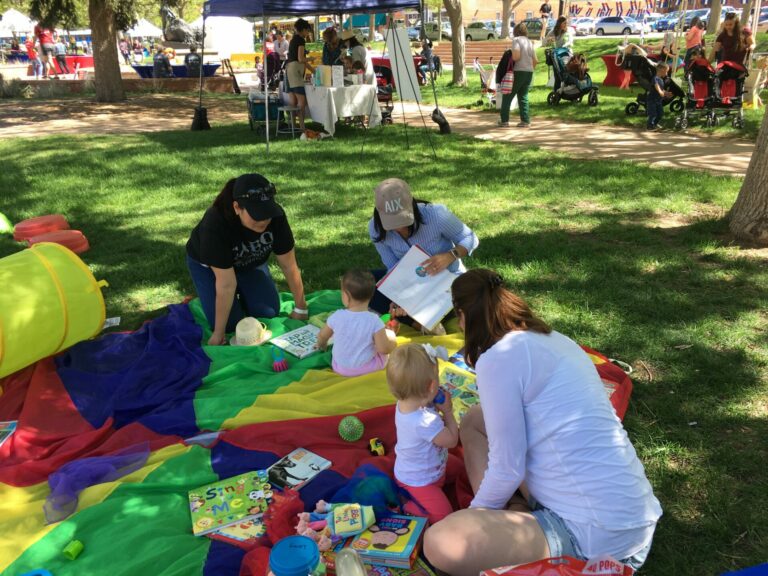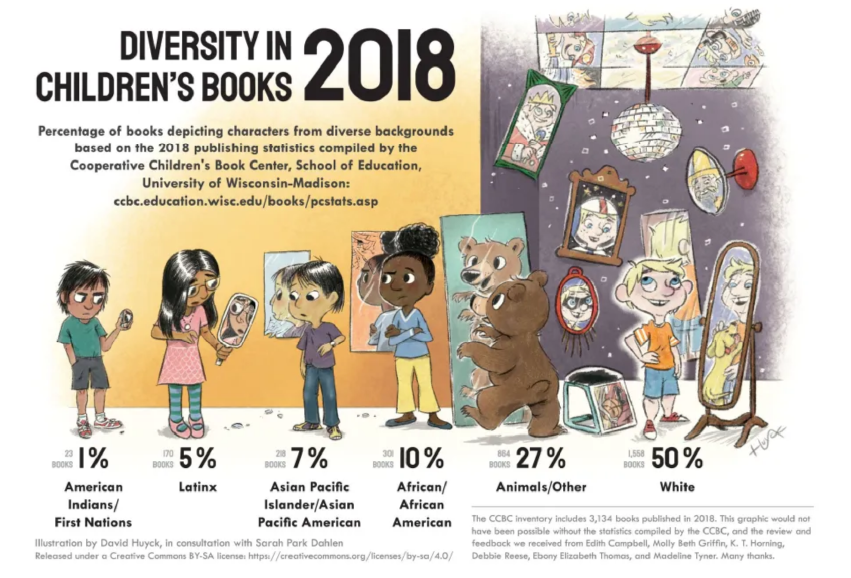You are here
Outreach, Partnership and Equity

Outreach & Partnership
Providing library services to community members outside of the library with no expectation that they come into the library.
Why provide outreach?
Many families don't use the library for a wide variety of reasons. For some, it may be due to practical reasons: lack of transportation, shift work, not being able to attend a weekday morning storytime due to work, not having proof of address to get a library card, having (or fear of getting) their library cards blocked due to fines/fees, not being fluent in English, or simply being too busy to visit. Others may avoid the library if they feel marginalized in their community or unwelcome for other reasons. Some parents who struggle with literacy may avoid the library due to not knowing how to navigate it.
All of these reasons for not using the library are valid, and people should be able to access library services without needing to come into the library. As Sharon Smitty Miller, librarian at the Fraser Valley Regional Library, stated, "The services the library offers are as important for those who don't walk into the library as for those who do." Just having access to library services can change lives. Watch this very powerful story of a girl in a migrant family whose world is transformed with a bookmobile. THIS is why libraries need to provide outreach services.
What does outreach look like?
First of all, your library does not need to have a bookmobile to provide outreach services! If it does, great; it is literally the iconic vehicle for delivering outreach services. If not, there are so many other options:
- Virtual services
- Pop-up libraries and programs
- Ready-assembled outreach kits for grab and go programming
- Book bikes
- Book vans
- Deposit collections
- StoryWalks
- Little Free Libraries
- Take and make activities
- Programming through local media
How do I start?
Providing outreach services may feel daunting, but there are steps to take to help you focus on specific underserved communities rather than trying to provide outreach to every nonlibrary user, all at once. Start with a close look at your community:
- Review the current demographics in your community, and look ahead to predictions to what changes might be coming, too.
- Ask who isn't coming to your library? Why aren't they coming?
- Select a target audience. No library can tackle trying to provide outreach to every member of the community who isn't using the library. Focusing on 1 or 2 demographic groups can help you begin serving those members most in need.
- Reach out to leaders and organizations in target communities early in planning; seek and incorporate their input from the start. Work through existing infrastructures rather than trying to create a new one.
- With your partners, set goals that focus on outcomes, rather than outputs; instead of setting goals for how many people you'll serve during this outreach, think instead of how the community members will benefit from the services.
- Determine venues and times convenient for your target communities by asking them directly. A critical component of providing outreach services is to offer them to your audience where they are, and when they're there.
- Determine what library services are most of need and interest to your target communities. Don't assume, or simply offer existing services; ask the members themselves.
- Build relationships with people in your target communities, and ask them to help spread the word about your new outreach services.
Where can I provide outreach services?
Ask members of your target communities what the most convenient venues for them are; where do they frequent? Where is easiest for them to get to? Outreach can also occur through broader partnerships with local organizations. Take a look at our Promising Partnerships page for some ideas.
Here are some suggestions, but the options are endless, and should focus on how to best reach your target communities:
- Community events
- Partner's venues
- Laundromats
- WIC offices and other social service agencies
- Reach Out and Read clinics
- Childcare centers and preschools
- Religious institutions
- Low-income housing developments
- Grocery stores
- Local parks
- Fast food restaurants
- Transit stations
- Summer Food Service Program feeding sites and food banks
Who has the time?
It can be challenging to provide outreach services with limited staff when there are so many needs in the library. Here are some tips on how to start making time:
- Prioritize outreach. This often needs to come from library administration, so ask for their support in this prioritization if necessary.
- Collaborate with partners to deliver library services
- Train volunteers to deliver library services
- If demand is high for your outreach services, establish schedules—state that staff will visit each preschool one day each month, for instance
- Are there existing in-library programs that you can simplify, or maybe eliminate, to free up some time?
Watch community outreach in action at the Broomfield Library
The GRT Outreach Success Cycle
Growing Readers Together developed the Outreach Success Cycle as a tool to help libraries better understand their community, discover target populations for outreach, and develop and evaluate the services that best fit the community's needs. The Outreach Success Cycle can be used as an independent tool, or during a consultation with a GRT Early Literacy Librarian.
Your Community: By the Numbers
State and county-level data on Colorado children and families.
The leading source of quality data about the nation's people and economy.
Shift Research Lab
Data tools and research providing insight into the metro Denver region.
Community Partners
Libraries across Colorado have built successful outreach partnerships with outside organizations. These partnerships allow libraries to connect with the community and provide greater access to services. The organizations listed here have multiple sites in Colorado, but every community is different. By getting to know your community, the local organizations that also have a stake in early learning and community support, and the target audience of your outreach, you have a greater chance of providing library services where they are needed most.

Equity
Windows and Mirrors: Making Diversity a Part of Every Storytime
All children need diverse books to offer them windows into the experiences of others, and mirrors that reflect their own experiences. Together we will explore how to integrate picture books and music that honor our differences into every storytime theme as well as how to evaluate diverse materials that respect different cultures, lifestyles, and “own voices” literature.
Research shows that children notice race at a very young age, and often draw erroneous conclusions if no one speaks to them about it. With a focus on story time, programming, collection development and user services, we will discuss and model ways librarians can talk about race and racism in age appropriate ways with children.
Diversity in Children's Books 2018 Infographic
National Equity, Diversity and Inclusion Programs
An online, self-paced anti-racism curriculum for library staff serving youth.
Seeking to address challenges today's youth face through a grassroots effort by offering education, resources, and community.
Offering tools, research, tips, and strategies for people who want to increase their own understanding and to help those working for racial justice.
The CCBC documents the number of books it receives annually that are by and about Black, Indigenous and People of Color and other aspects of diversity. This page provides links to CCBC diversity resources, and selected links to resources beyond the CCBC.
Supporting collection development and reader's advisory with the analysis of picture books featuring Black and Indigenous people and People of Color (BIPOC).
An organization promoting advancement in the creation and publication of books in which all children can see themselves.
Creates an annual summer reading list and other materials and opportunities to recognize the humanity of Indigenous and People of Color (IPOC) in youth literature.
We will continue to compile resources to support your organization's equity, diversity, and inclusion advancement. To add to this list, please contact us.
Lessons Learned from the SPELL Project
The SPELL project ran from 2012 – 2016 engaging several Colorado libraries. Lessons learned helped generate ideas for serving low-income families with early literacy best practices. Find more information to design your own SPELL project – and why.
Eliminating Overdue Fines and Fees for Lost/Damaged Materials
After parents reported heartbreaking stories about their reluctance to check out books for their young children because they could not afford the fines, the Colorado State Library looked into the details of charging overdue fines. What they discovered might surprise you!
Reaching and Supporting Parents of Young Children
Recommendations from the SPELL project for staff training, library spaces, collections, programs, policies, and customer services for reaching this vital audience. You will also find information on potential partners and how to engage them. Parents and their young children are worth the investment.
Eliminating Barriers to Library Use
Understanding circumstances that lead to non-library use is key to strategizing ways to reach this audience. Take a look at Longmont Public Library’s example for inspiration. The positive implications for encouraging non-library users to become library users are significant!






Connect With Us





